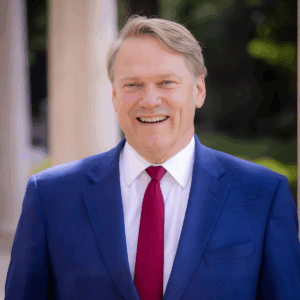One Brand, Many Audiences: Higher Ed Brand Stewardship Across Diverse Divisions
Learn how Moody Bible Institute unifies its mission and brand across divisions with practical strategies for stronger higher ed brand stewardship.
Featured
When it comes to navigating hardship, mission-driven leadership is the anchor that keeps faith-based institutions from drifting.
 Dr. Gayle Beebe, president of Westmont College, has lived this out across decades of service in higher education.
Dr. Gayle Beebe, president of Westmont College, has lived this out across decades of service in higher education.
From devastating wildfires and pandemics to economic downturns and cultural headwinds, Beebe has led Westmont through some of higher ed’s most difficult waters.
Yet what stands out most in our conversation isn’t the challenges themselves—it’s how he meets them.
His steady focus on values, planning, and personal discipline offers a playbook for mission-driven leadership during turbulent times.
In a world where many institutions adapt their mission to meet enrollment goals or political pressures, Beebe makes the case for the opposite.
Stick to your mission, especially when it’s hard.
Throughout our conversation with Dr. Beebe, he shares how mission-driven leadership kept Westmont anchored even as it faced some of its greatest trials.
One such moment came in 2008 during the devastating “Tea Fire,” which destroyed a third of the Westmont campus, including 15 faculty homes and multiple academic buildings.
It was a crucible moment for Beebe and his team.
“We had just pulled the construction permit the day before for a major new building. The fire changed everything—but we had to press forward with rebuilding and construction at the same time.”
This moment tested not only their emergency response but their commitment to long-term strategic goals.
Instead of retreating or scrapping their plans, they stuck to their vision.
Beebe’s approach was clear:
For Christian colleges, the pressure to conform can be intense—especially as cultural values shift and state regulations challenge traditional practices.
During the Obama administration, Beebe recalls facing serious scrutiny at the state level over the right to hire Christian faculty.
He frames this challenge as another crucible moment—one that demanded clarity of purpose and resolve.
“If we lose the right to hire Christians for our faculty, we lose our identity as a Christian college.”
Rather than compromising, Beebe and Westmont doubled down on their commitment to hiring faith-aligned faculty and staff.
He even created what he calls the “Faith and Fit” interview for every final faculty candidate.
“I’m not here to evaluate your competence in your field. I want to hear about your walk with Christ, where you go to church, and what your spiritual disciplines are.”
This level of intentionality is a hallmark of mission-driven leadership—a refusal to allow convenience or external pressures to redefine who you are.
As Beebe points out, many families are now looking for institutions that clearly articulate and consistently live out their values.
In a culture of increasing ambiguity, clarity becomes a competitive advantage, enabling you to find and cultivate mission-fit students.
Another area where mission can drift is athletics.
It’s no secret that recruiting athletes can quickly become a numbers game, especially for smaller colleges under enrollment pressure.
But Beebe urges presidents and boards to stay vigilant.
“The danger is putting winning above mission.”
He insists that coaches must not only strive for athletic excellence but also model deep Christian commitment.
“When you hire coaches who are serious about Christ and their athletes, you can maintain excellence without sacrificing your mission.”
That kind of alignment—from admissions to faculty hiring to athletics—is what builds a culture that’s coherent and trustworthy.
And it’s how institutions avoid the kind of fragmentation that erodes long-term sustainability.
A thread that runs through every part of Beebe’s story is discipline.
And not just strategic discipline, but spiritual and emotional discipline as well.
Beebe starts every day at 4:00 AM.
He spends the early hours reading, praying, and reflecting on the previous day.
“How did that go? Is there anyone I need to follow up with? Anyone I need to apologize to?”
He believes deeply in the power of morning reflection to cultivate presence and emotional availability—qualities that he sees as essential to leading well through change.
“Your vision has to exceed your inconvenience. If you’re preoccupied with the inconvenience, you’re already losing.”
That statement stuck with me.
Because we all know how easy it is to get buried in the grind of leadership—the back-to-back meetings, the sudden emergencies, the budget pressures.
Being present means more than just showing up to meetings or giving speeches.
It’s about being emotionally engaged with your team, spiritually grounded in your values, and mentally aware of what’s happening across your institution.
As Dr. Beebe shared, presence is cultivated through intentional practices like morning reflection, prayer, and asking hard questions about the day ahead.
It’s that daily discipline that enables leaders to respond—not react—to the challenges they face.
Because when leaders are present, their people feel it.
And when leaders are absent—emotionally or otherwise—their teams drift, and the mission follows.
As Westmont looks to the future, Beebe remains both cautious and curious.
Artificial intelligence, he notes, is one of the fastest-moving challenges—and opportunities—facing higher education today.
Rather than ignore it or resist it, he’s investing in it.
Westmont has launched the CAT Lab (Center for Applied Technology) to explore the implications of AI in both academic and spiritual formation contexts.
They’ve also launched a college-wide transition to Salesforce, helping streamline systems and improve data access for teams across the institution.
But even in innovation, Beebe is measured.
He believes in maintaining a core identity while adapting methods.
“Where we’re timeless is in our Christian mission. Where we’re time-bound is in how we apply that mission in new seasons.”
This blend of moral rootedness and adaptive thinking is what allows institutions to thrive—rather than just survive—in times of uncertainty.
As we wrapped up our conversation, Beebe shared one final insight that I think every leader needs to hear:
“Stay emotionally present to your people and to your projects.”
It’s not enough to launch an initiative.
It’s not enough to cast a vision.
If you don’t stay emotionally engaged, people will wait to see what you do before they commit. They’ll assume the effort is temporary. They’ll fall back into old patterns.
That’s where change management fails—not because the ideas were bad, but because the leader disappeared.
“People often sabotage change by assuming leaders won’t follow through. But if you stay with them, emotionally and relationally, you can overcome the resistance.”
That’s the kind of leadership that isn’t flashy—but it’s faithful.
And it’s what our colleges need more than ever right now.
Whether you’re leading a small Christian college or a large public university, the temptation to compromise under pressure is real.
But as Dr. Gayle Beebe’s story shows, mission-driven leadership is what sustains institutions through the fire—literally and figuratively.
It’s what builds trust, attracts like-minded students and faculty, and ultimately provides the clarity to move forward when everything else feels uncertain.
So ask yourself: In moments of institutional stress, are you anchored to your mission?
Or are you adjusting your identity to fit the moment?
To hear Dr. Beebe’s full insights, tune in to Episode #204 of The Higher Ed Marketer podcast now!
CRM Consulting — Optimize Your CRM for Mission-Driven Impact
In this episode, Dr. Gayle Beebe shared how Westmont College leveraged Salesforce to streamline operations, improve data access, and align systems with their mission.
That’s mission-driven leadership in action.
At Caylor Solutions, we help colleges and universities do exactly that through our CRM Consulting services—whether you use Slate, Element451, Salesforce, or another platform.
Your CRM isn’t just a database.
It’s the digital backbone of how you engage students, track relationships, and make mission-aligned decisions.
✅ Customize your CRM around your unique enrollment goals
✅ Optimize workflows to reduce manual work and human error
✅ Align system capabilities with your mission and institutional values
✅ Train staff to confidently use your CRM to its fullest
When systems are aligned with strategy, your team gets time back to focus on what matters most: building relationships and advancing your mission.
Let us help you make your CRM a tool for transformation—not frustration.
Ready to optimize your CRM? Let’s connect today.
Then you’ve got to know how to write for the web. That’s why we want to send you our popular ebook: Writing for the Web: 7 Secrets to Content Marketing Success for Education Marketers!
With this helpful resource, you’ll learn how to:
In short, you’ll be able to write the copy that makes your digital marketing strategy work for you. Download your copy today!
Featured image via westmont.edu
Subscribe to The Higher Ed Marketer podcast today!